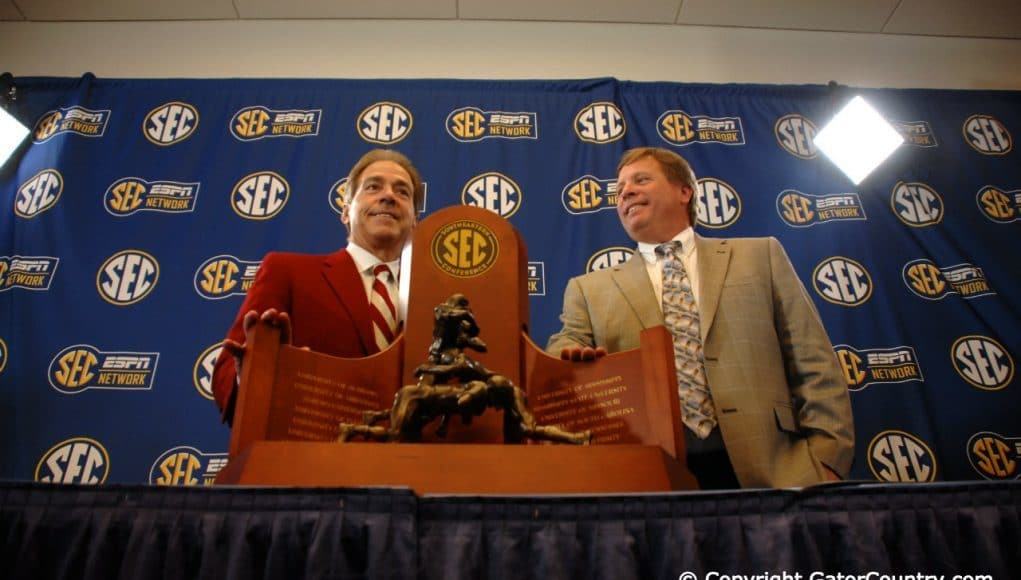The confetti fell on to the turf at the Georgia Dome, a familiar feeling for Jim McElwain. He had stood underneath that confetti as both a winner and loser, this time the latter.
The Alabama Crimson Tide beat Florida in the 2015 SEC Championship game and are fresh off another National championship. The stories of the demise of the Crimson Tide dynasty falling are long forgotten. The championship was the fourth for Nick Saban since he took over at Alabama, but Rome — and Alabama — wasn’t built in a day. Saban needed time to build the machine he has now in Tuscaloosa.
Saban’s first year in Tuscaloosa included a home loss to Louisiana Monroe on his was to a disappointing 7-6 season. Alabama had the league’s seventh rated scoring offense (31.75 points per game) and the ninth rated total offense. Saban needed to make a change on offense and he went out west to hire Jim McElwain from Fresno State. McElwain was one of two coaches on the 2008 staff that were in their first season and the other eight coaches were entering their second having come to Alabama with Saban.
“I’m grateful for that. But I was able to learn from him in a lot of different things that were valuable,” McElwain said before Florida’s matchup against Alabama in the SEC Championship Game in 2015.”Whether he believed it or not, I sat there and soaked every second and word he had. Took notes. Tried to learn as much as I can.”
The Tide won their first 12 games in McElwain’s first season before losing to Florida in the SEC Championship game and then Utah in the Sugar Bowl but the groundwork was done, Saban had changed the culture in Tuscaloosa.
It’s what McElwain is tasked with now as he enters his second season in Gainesville.
McElwain is using what he learned under Saban to build his own program.
“Part of the maturation of the organization is you have to go through some things to learn from, and keep moving forward along with some of those bumps,” said McElwain. “I don’t know what they were the first year, but they made a heckuva run that second year and learned some things that second season that really propelled us the next three seasons I was there.”
The Florida Gators suffered speed through bumps of their own in Mac’s first season. A 6-0 start was derailed when Will Grier was suspended for violating the NCAA’s policy on performance enhancing drugs. Florida finished the season 4-4, ending McElwain’s first season with an embarrassing 41-7 loss to Michigan in the Citrus Bowl. More recently, McElwain made a coaching change, deciding to part ways with defensive backs coach Kirk Callahan.
In life, however, there are not shortcuts. Saban won a national championship in his third season at Alabama, Urban Meyer won a championship at Florida in his second, but sustained success needs a solid foundation of core values and principles.
“There’s a lot of short-term solutions that end up backhanding you later in life,” McElwain said before the Citrus Bowl. “There are a lot of short cuts you can take to make it look prettier early, but if you don’t have everything set — including everybody in the organization — which we are still in the process of making sure we understand where we need to be as a total program.”
Florida’s 10-win season was unexpected and far ahead of schedule. A perennial power in the SEC East, Florida just had a senior class make it to their first ever SEC Championship game, something that has only happened to four Gators senior classes in the game’s 23-year history. That stat alone should tell enough about the task that McElwain is facing.
It begins with recruiting, the lifeblood of every college football program in America. Saban earned the No. 1 recruiting class in 2008 by landing players like Julio Jones, Mark Barron, Terrence Cody, Marcel Dareus, Dont’a Hightower, Mark Ingram and Courtney Upshaw. They laid the foundation for the Alabama dynasty and gave the Crimson Tide its first Heisman winner in Ingram.
McElwain put together a recruiting class in a month that featured freshman starters Antonio Callaway, CeCe Jefferson, Martez Ivey, Fred Johnson and Tyler Jordan. With a full year under his belt the Florida Gators have a massive class with 26 commitments, including 12 midyear enrollees.
“I just know we got some good guys coming,” McElwain said after the Citrus Bowl. “Good things for the Gators.”
The Gators 2016 schedule sets up nicely for another run to Atlanta, a place McElwain hopes to make Florida a mainstay for years to come. His mentor, the coach who gave him the opportunity that propelled him into the seat where McElwain now sits has provided the blueprint. The SEC Championship game showed how far Florida is from matching Alabama on the field but McElwain is patient and knows the work that it will take to reach that point.
He not only has the Alabama blueprint, he had a hand in creating it and is now using it in Gainesville.


